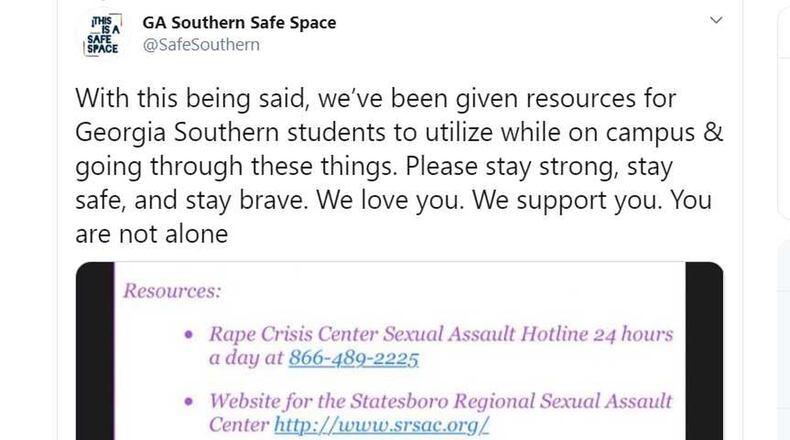The social media post was obscene and racially offensive.
“(Expletive) y’all for making a big deal out of george floyds death it’s not that big a deal (sic),” the caption read underneath the picture of a young, white woman who had her middle finger extended.
The message was shared by a young man who named the woman in the picture and said she’s been accepted to enroll this fall at the University of North Georgia.
“(I)s this the type of person you would like to represent your school?” the man asked. His response and share of the original post has garnered more than 14,600 retweets since May 30.
The question reflects an ongoing challenge for college officials in Georgia and across the nation.
In recent weeks, there’s been a surge of students being outed on social media for racist posts, as well as being accused of sexual assault and other misconduct. Several “safe space” Twitter pages were created about Georgia schools for people to share their stories of sexual assault, some including names of alleged offenders and details of the encounters. The pages have no affiliation with any college or university, and some were shut down late last week. Some of the sites included images of the schools.
The exposure has resulted in what some anecdotally say is an unprecedented number of student expulsions and rescinding admissions, including in Georgia.
>> RELATED: Outrage at two Georgia colleges after students' racist posts
Wesleyan College, a private women’s school located in Macon, expelled a student Thursday for a post that read “bear down on these (expletives),” using a racial slur for African Americans. Valdosta State University held a virtual forum Thursday after a white student was accused of posting a picture of himself in blackface. Georgia Southern University promised forums for students and faculty after a similar picture of a white student in blackface emerged. The University of North Georgia said in a statement the George Floyd post purportedly by the incoming student did not reflect its values and has been shared with its Office of Student Integrity for review and action, as appropriate.
Some current and former students accused of sexual misconduct and assault have posted messages apologizing for their actions. Others who’ve been named have posted angry and frustrated responses defending themselves.
Social media shaming by college students is not new, but there is a more aggressive, and organized, nature to the effort. Many calls for action on social media contain a common phrase: “Twitter do your thing.”
Casey Near, executive director of counseling for Collegewise, an organization that helps students through the admissions process, believes more people feel empowered to use social media to expose such actions thinking “if I say something, the college will do something.”
There are likely more such efforts to come.
“That is the social consequence of free speech,” said Samantha Harris, vice president for procedural advocacy of the Philadelphia-based Foundation for Individual Rights in Education, which closely monitors campus speech issues nationwide.
Colleges and universities across Georgia have released statements in recent days affirming their commitment to diversity and condemning racist posts. University System of Georgia officials have seen many of the posts and the safe space pages. The system’s schools have officials who investigate misconduct complaints. The system’s spokesman encouraged students to contact their school directly with a complaint.
“There are established mechanisms and processes to handle these claims,” system spokesman Aaron Diamant said. “We can’t use them if (the student) doesn’t come to us.”
Near said many students are unaware that schools can rescind their admissions offers. The National Association for College Admission Counseling did a survey in 2009 that found 1 in 5 U.S. schools rescind their admissions offers each year. One-third of those decisions resulted from disciplinary issues. The association no longer does such research.
Harris wonders if this is the moment social media reshapes the notion of what is free speech. Her organization expressed its concerns in a statement last week about how schools, particularly public institutions, are investigating and punishing controversial speech.
“While the level of passion with which these issues have been argued in recent days may have changed, the underlying First Amendment principles have not,” FIRE wrote. “The overwhelming majority of such expression, whether it supports or criticizes peaceful protests, police tactics, or violent disturbances, is protected — either by the First Amendment, by universities’ own promises of free expression, or both.”
There’s been increasing discussion about the issues that have resulted in these social media outings. The past few weeks of protests about racism and police violence against black people have led to some of the reports of racist speech. With sexual misconduct, reports of dating violence at Georgia’s 20 largest colleges and universities nearly doubled from 30 in 2016 to 58 in 2018, the most recent year available. Reported rapes rose from 57 to 65 between those same years. The data is based on annual reports the schools are required to post on their websites.
Despite the increased reporting, some alleged sexual assault survivors are reluctant to share their accounts with campus authorities or law enforcement. The safe space sites offer accusers anonymity.
“I was scared to go to the police for some reason and didn’t want to get them involved,” a tweet posted on the site created for Georgia Southern students read.
Naming names, Harris said, could be defamatory. The safe space site for University of Georgia students was shut down last week.
Still, Collegewise’s Near said the recent outings should serve as a call to students, high school counselors and college officials to have more frequent discussions about the importance of thinking beforehand about the messages students post online and their consequences.
“There are punishments for your actions,” Near said. “Some students know that. Maybe more will know that now.”
About the Author
Keep Reading
The Latest
Featured





